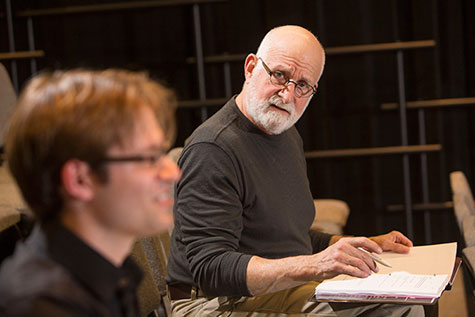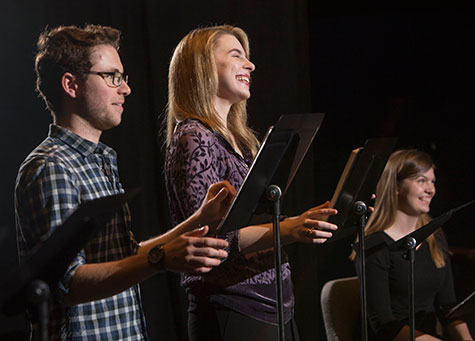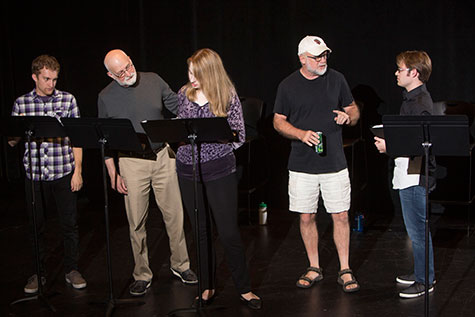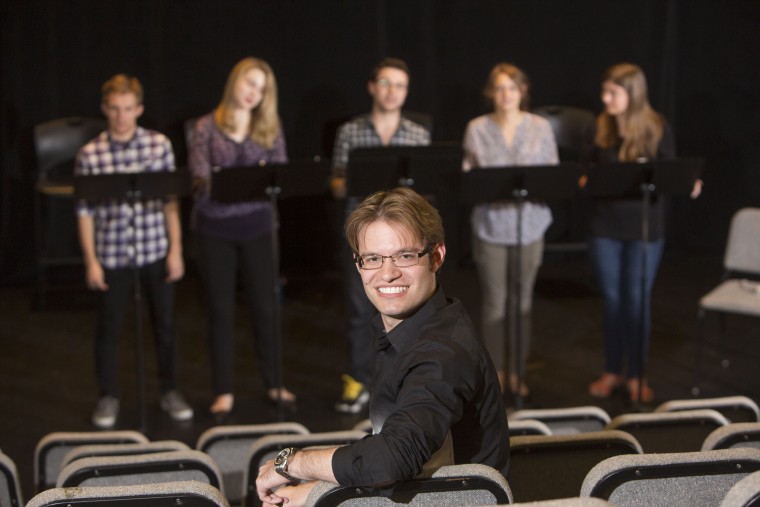You’ve done it. You’ve graduated. You’ve joined the real world. Now what?
In “The Divine Buoyancy of Being,” Cary Simowitz explores what happens when youthful dreams collide with economic reality, entry-level positions and the unintended consequences of a governmental shutdown.
This week, “The Divine Buoyancy of Being” will receive its world premier staged reading at Washington University in St. Louis as part of the annual A.E. Hotchner New Play Festival.
Sponsored by the Performing Arts Department in Arts & Sciences, the festival is named for alumnus A.E. Hotchner, who famously bested Tennessee Williams in a campus playwriting competition. Also debuting will be “We the Congressmen” by recent graduate Katie Goldston and “Library Love Story” by sophomore Rachel Wilson.
Simowitz, a 2013 Arts & Sciences alumnus in his third year at Washington University School of Law, discusses his work and the playwriting process:
“The rush of ‘meeting’ your characters for the first time, the very same imaginary people who have lived and loved and cursed and raged in your mind for years, is exhilarating.”
~ Cary Simowitz
What first drew you to theater?
I’ve been drawn to the theater ever since I attended one my older sister’s plays as a young child. Theater has an ability, unlike any other medium’s, to capture the attention and imagination of an audience. Everything is live. No two shows are ever the same. There’s an electricity in the air that can’t be found in a dark movie theater or on your couch in front of the TV.
Tell us about “The Divine Buoyancy.” What inspired the play?
In a way its my love song to the graduating class of 2013. It takes place entirely on campus and at Kaldi’s Coffee on Demun. It begins just after Commencement. Darcie, the main protagonist, is sitting on the roof of Graham Chapel, in full graduation regalia, contemplating the world below. Most of the story takes place the following October, during the 16-day shutdown of the federal government. But we also jump forward and backward in time, Billy Pilgrim-style, so the plot is chronologically out of order.

Who is Darcie? What’s she thinking about up on that roof?
Darcie is a dancer, but she’s been rejected by every graduate MFA program to which she applied. Her post-graduation plans are in ruins. The person with whom she thought she’d spend her life has left for graduate school. She is unmoored, devastated and more than a little terrified.
At this point, the plot lurches forward to October. Darcie has acquired an entry-level position with The United States Department of Agriculture. But, with the furlough in full swing, Darcie is laid off and takes a temporary job at Kaldi’s. There, she’s visited daily by Amit Husa, her best friend and former classmate, who is now a first-year law student; and by Jaz, a flirtatious and enigmatic WashU senior.
But when Ethan, a troubled character from Darcie and Amit’s shared past, shows up at the coffee shop, Darcie is forced to confront a rash decision she made at the beginning of the play.
Your previous work, “Ekphasia, or ‘The Shadow Girl’ ” — featured in last year’s Hotchner Festival — just won grand prize for stage play in the 2015 New York Screenplay Contest. What do you learn through the workshop process? What is it like to finally hear the words spoken by actors?
The rush of “meeting” your characters for the first time, the very same imaginary people who have lived and loved and cursed and raged in your mind for years, is exhilarating. It can cause lack of appetite, sleep-deprivation and a dewy-eyed, rose-colored euphoria. It’s akin to falling in love.
Then the honeymoon begins to wane. The characters exist, but they exist with all of their flaws and contradictions. They speak too much in some scenes, or too little in others. They say the “wrong” things at the “wrong” times. And then you have to introduce them to your friends. Actors question their motivations. Directors question their actions. Dramaturgs question their interior lives. Their interpretations may not resemble what you originally envisioned, but they add depth and complexity. The characters start to develop independent lives.
At the end of the day, theater is all about teamwork. Actors and audience are connected in a process of mutual creativity, discovery and emotionality. It’s a truly communal experience.

About the Hotchner Festival
The A.E. Hotchner New Play Festival begins at 7 p.m. Friday, Sept. 25, with Goldstein’s “We the Congressmen,” directed by William Whitaker, professor of practice in drama.
The festival continues at 2 p.m. Saturday, Sept. 26, with Wilson’s “Library Love Story,” directed by Paige McGinley, assistant professor of performing arts. The festival will conclude at 7 p.m. that evening with Simowitz’s “The Divine Buoyancy of Being,” directed by Henry I. Schvey, professor of drama.
The A.E. Hotchner New Play Festival is coordinated by Carter W. Lewis, playwright-in-residence. Dramaturg is Michele Volansky, former Literary Manager & Dramaturg for Steppenwolf Theatre in Chicago and currently chair of the Department of Theatre & Dance at Washington College as well as an associate artists for the prestigious Philadelphia new play organization, PlayPenn.
All readings are free and open to the public, and take place in The A.E. Hotchner Studio Theatre, located in Mallinckrodt Center, 6445 Forsyth Blvd. For more information, call 314-935-5858, visit pad.artsci.wustl.edu or follow us on Facebook.

